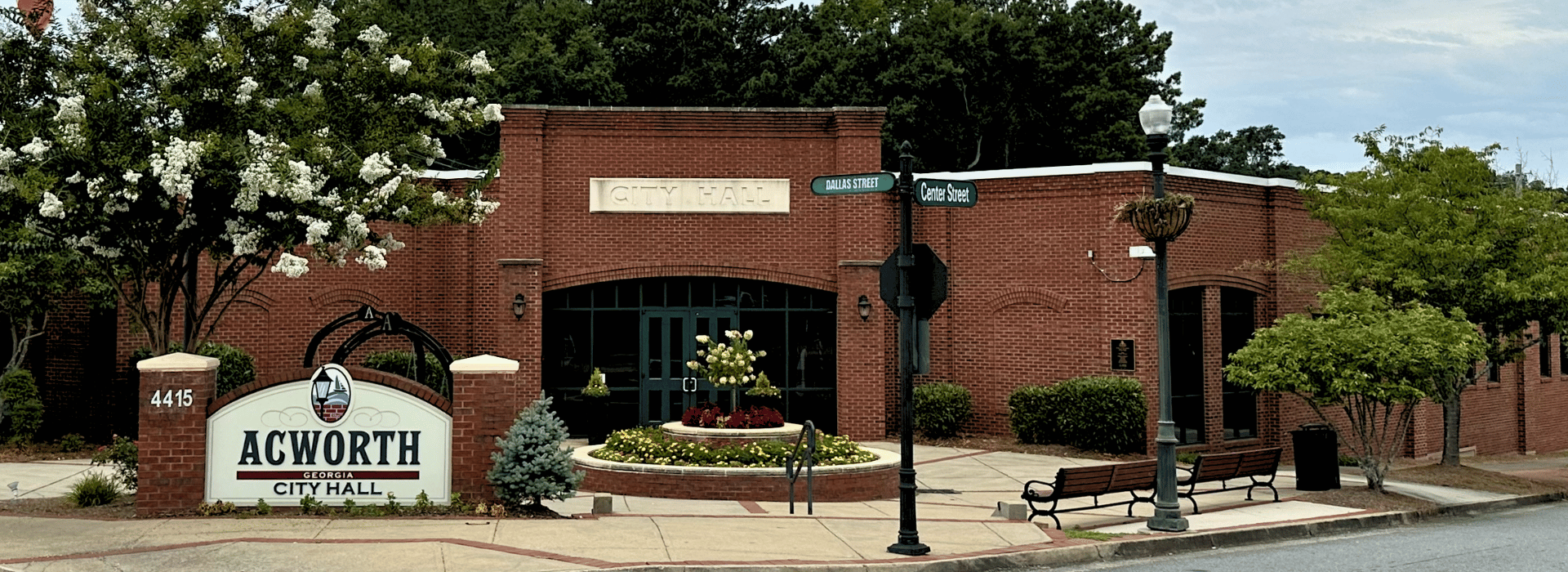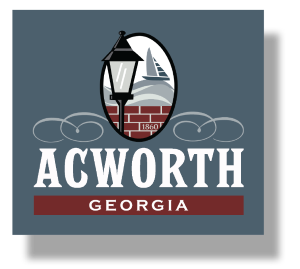
Hours:
Monday through Friday
8:00 AM – 5:00 PM
Address:
Acworth City Hall
4415 Center Street
Acworth, GA 30101
Contact List:
Property Tax Inquiries:
propertytax@acworth-ga.govFinance
Mission: Maintain the City’s financial stability through monitoring internal controls, supervision of financial growth and provision of accurate accounting of City funds both internally and externally to taxpayers.
The City Treasurer directs the Financial Administration Department as well as the Customer Service Department for utilities. The Financial Administration Department consists of five accounting staff, including the City Treasurer. Functions of this department include financial reporting, budgeting, and all aspects of accounting. All financial information is gathered and centralized in this department for distribution to other departments, elected officials, vendors and citizens. Payments to vendors and employee payroll are processed through this department.
Annually, the Mayor and Board of Aldermen adopt a budget for the City’s fiscal year. The budget is amended as needed periodically throughout the year. Each department determines their budgeting needs, which are reviewed by the City Manager and forwarded to the Mayor and Board of Aldermen for review.
Property Taxes are levied in mid-summer by the Mayor and Board of Aldermen. The taxes help provide funding for general administrative services as well as public safety, public works, building inspections, code enforcement and parks and recreation. The 2023 millage rate is 8.95 mills. Each year the City must undergo an independent audit. At this time, the financial administration department assembles a Comprehensive Annual Financial Report. This report displays the economic and financial position of the City with statistical information for the past ten years. The Financial Administration Department has submitted this report to the Government Finance Officer’s Association of the United States and Canada for review to receive the Certificate of Achievement for Excellence in Financial Reporting. The City has been awarded this prestigious award each year a report was submitted. The Certificate of Achievement is the highest form of recognition in the area of governmental accounting and financial reporting, and its attainment represents a significant accomplishment by a government and its management.
Property Tax Information
Yes, CLICK HERE to make your payment.
** You may pay your current year taxes between mid September and mid November. If you are paying after this deadline, please contact our office for payoff.
Payment methods accepted are: American Express, Discover, Mastercard and Visa. A convenience fee is charged by the payment processor.
Yes, Property Tax information is available on our website at pay.acworth.org.
No, Failure to receive a tax bill does not relieve you of the responsibility to make payment by the due date. Please contact our office or visit our website for updated tax information.
Taxpayer Reassessment Relief Act (Floating Homestead Exemption), This exemption is automatically granted to anyone that has applied for and been granted the Homestead Exemption with Cobb County. The amount of this exemption equals the balance of increase in assessed value of your home at the time homestead exemption was granted. There must be an application on file for regular homestead with Cobb County.
Over 62 Exemption – Homeowners who are 62 years of age on or before January 1, and whose annual NET income does not exceed $10,000 for the immediately preceding tax year (including income of the spouse but not including Social Security or retirement income), are entitled to a $4,000 exemption on City of Acworth taxes as well as on the state, county bond, fire district tax categories shown on the Cobb County tax bill. You must furnish proof of age and income when you apply with Cobb County. This exemption is received in Acworth when it is granted by Cobb County so there is no need to apply in Acworth.
Disability – Homeowners who are disabled on or before January 1, and whose annual NET income (including income of the spouse but not including income received as a result of the disability; e.g. disability retirement) does not exceed $12,000 for the immediately preceding year are entitled to a $22,000 exemption. This exemption is also available in Cobb County. You must furnish proof of income and a doctor’s certificate stating that you are disabled and that the disability is likely to remain permanent when you apply with Cobb County. This exemption is received in Acworth when it is granted by Cobb County so there is no need to apply in Acworth.
State Veteran’s Disability – Homeowners who are disabled veterans as defined in O.C.G.A. 48-5-48 are entitled to an exemption in all tax categories. You must provide legally required documentation. This exemption extends to the un-remarried surviving spouse or minor children at the time of the applicant’s death, provided they continue to occupy the home as a residence and homestead. This exemption is received in Acworth when it is granted by Cobb County so there is no need to apply in Acworth.
State Un-remarried Surviving Spouse – A homeowner who is the un-remarried surviving spouse of a member of the U. S. armed forces killed in any war or conflict as defined in O.C.G.A. 48-5-52.1 and receiving spousal benefits from the U. S. Department of Veteran’s Affairs is entitled to an exemption in the state, county, municipal and school tax categories. Legal documentation is required. This exemption is received in Acworth when it is granted by Cobb County so there is no need to apply in Acworth.
City taxes for 2009 and all prior years can be found on the Cobb County Tax Commissioner’s website (www.cobbtax.org). Copies of tax bills for 2009 and prior years can be printed from the Cobb County Tax Commissioner’s office website (www.cobbtax.org). City taxes billed by the City of Acworth will be available on our website beginning with the 2010 taxes to be billed by mid September each year.
Taxes for the current year (beginning with 2010 taxes) can be paid by mailing a check to the City of Acworth, 4415 Center Street, Acworth, GA 30101. Please make your check payable to the City of Acworth and include your parcel number in the memo field. Payments may also be made in person at Acworth City Hall (above address) during normal business hours of 8:00 a.m. – 5:00 p.m. Monday-Friday excluding holidays. We accept cash, check, money order and credit card payments (Visa, Mastercard and Discover). You may also pay online with a credit card at www.acworth.org.
If your taxes are paid in escrow, please allow your mortgage company to pay us. We mail statements to taxpayers and will be glad to send statements to mortgage companies.
It is the homowner’s responsibility to ensure we have the correct mortgage company name and mailing address.
We do get requests from mortgage companies for tax amounts on specific parcels and provide them with taxes due at that time. If you need to check to see if your taxes have been paid, please contact our Office at 770-917-8903 or visit our website.
Our property tax digest is completed by the Cobb County Tax Assessor’s Office and the Cobb County Tax Commissioner’s Office. Our tax bills are generated from this information after we receive the digest, usually by mid September each year as follows:
Fair Market Value of Property (as determined by the Cobb County Assessor’s Office) $100,000 multiplied by 40% (which is what GA Dept of Rev says we are able to tax) equals $40,000 of Assessed Value.
Exemptions are then removed from the assessed value such as the Over 62 Exemption. If you have applied and are eligible to receive this exemption then your taxable amount is $36,000.
The City Tax of 8.95 mils would then be applied to the taxable amount for every $1,000.
$36,000/1000 = $36 X 8.95 = $322.20
OR
$36,000 X .00895 = $322.20
Your mailing address (city) is determined by the United States Postal Service. Your property may be inside the city limit boundary of Acworth but your mail may be processed and delivered by a Kennesaw Post Office. There are also properties inside the city limits of Kennesaw that have an Acworth mailing address as well.
Taxes are billed at the end of each year for the period of January 1 – December 31. These bills are generated as of January 1. What generally happens at a closing is a transaction between the buyer and seller for the seller’s portion of estimated taxes that will become due at the end of the year. In this instance, taxes are collected from the seller and paid to the buyer by reducing the proceeds paid to the seller at closing. Taxes are not paid to the City of Acworth after closing. If taxes are to be “collected” at a closing, it is stated in the sales contract and the lawyer’s office will forward taxes collected to the City of Acworth. The State of Georgia requires that tax bills are generated and mailed to the owner of record on January 1st so the seller will receive a bill on property that they have sold (O.C.G.A. 48-5-18). Both buyer and seller are made aware of this at closing and the property tax bill also states that this bill should be forwarded to the new owner. This can be very confusing and often results in taxes becoming past due. Failure to receive a tax bill does not relieve this liability. Please contact your closing attorney or the City of Acworth if you have questions.
Taxes are generated and mailed to the owner of record on January 1st of the tax year according to Georgia law (O.C.G.A. 48-5-18). If you get a tax bill for property that you sold, please forward it to the new owner as quickly as possible. You may also return the bill to us with the new owner’s name and address and we will gladly update our records and forward the bill to the new owner. If you purchased the property after January 1, a property tax return (to declare taxable property you own) should be filed with the Tax Assessors’ Office between January 1 and April 1 of the following year.
Tax bills are mailed to the taxpayer because property taxes are the taxpayers responsibility. Mortgages change so frequently that we find it more convenient to the taxpayer to send the bills directly to them. We do send statements to mortgage companies if the company name and mailing address are provided to us. We ask that you forward your tax statement to your mortgage company for payment if your statement does not indicate that we have already mailed a statement to your (correct) mortgage company. We commonly get requests from mortgage companies for tax amounts due and promptly make those amounts available to them at that time.
There are homestead exemptions available to homeowners that complete and file the required applications by April 1st of the tax year (O.C.G.A 48-5-40 through 48-5-54). To be eligible for application you must own, occupy, and claim your property as your legal residence on January 1st. Only one person need apply if more than one name appears on the deed. The exemptions are automatically renewed each year unless there is a change in ownership or you no longer meet the eligibility requirements.
You can view our Master Fee Schedule HERE
or use:
https://mfs.acworth-ga.gov/
The millage rate for City taxes is 8.95 mills.
Property taxes are billed in the fall of the year, usually by mid September, for City Taxes that cover January 1- December 31 of that same year. The due date is 60 days from the date taxes are billed (O.C.G.A. 48-5-148). You should receive a separate statement from Cobb County for your County/State/School Taxes.
Interest accrues on the outstanding balance every month until paid in full. A 5% penalty will be charged 120 days after the due date and every 120 days thereafter, not to exceed 20% of the taxes due.
On June 4, 2020, the City of Acworth adopted an ordinance to implement an assessment to recoup the costs associated with funding streetlights along the City’s rights-of-way. The streetlights that are controlled and energized by Georgia Power, Cobb EMC, and Acworth Power within the City have an associated monthly cost that is billed to the City of Acworth. It is no longer feasible for the City to continue absorbing this cost. As such, the City has implemented a $2 per month assessment included in your tax bill. A copy of the ordinance can be found HERE.




